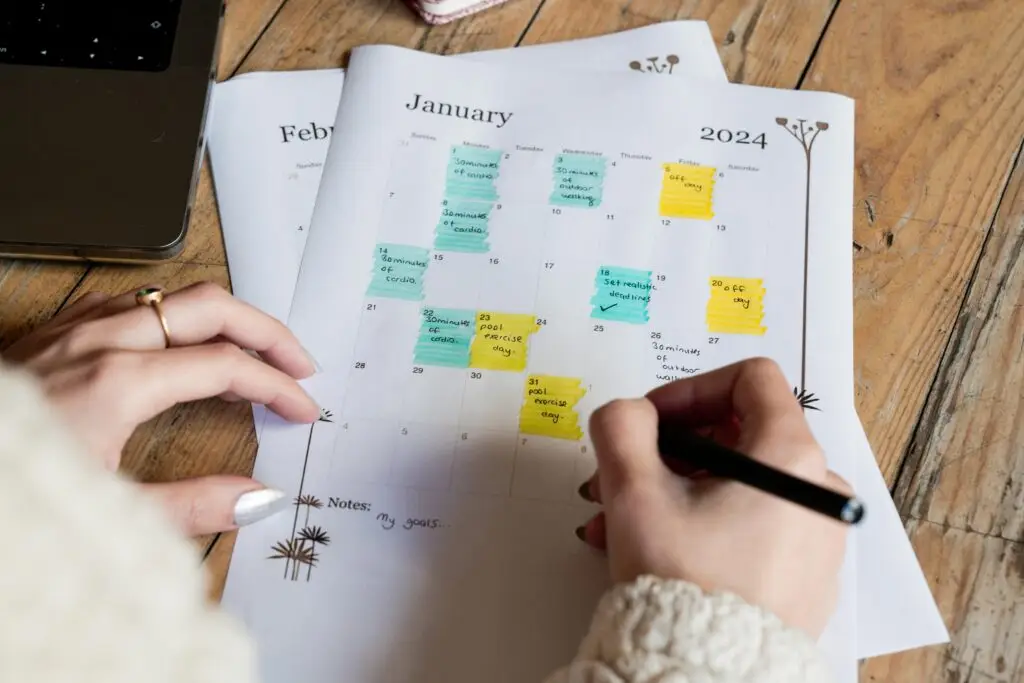📍 Why I’m Sharing This
I used to feel like I was always running 10 minutes behind and could never quite catch up. From juggling assignments to almost being late for work, to trying to stay connected with friends and family — it was a lot. Life felt like a game of Whack-a-Mole where the second I handled one thing, something else popped up.
But through all those chaotic moments, I kept trying new systems, routines, and tools — experimenting with everything from to-do lists to time blocking and seeing what stuck. After enough trial and error, I finally landed on five core time management strategies that actually work for me — and might work for you too.
So if you’re a student with a job, or someone who’s just got way too much going on — I hope this helps.
🎯 Plan Weekly So You Don’t Panic Daily
One of the biggest game-changers for me was learning to plan my week before it begins.
It’s simple, but powerful: when you start the week with a plan, you know what to expect. You don’t have to stress about missing deadlines or being caught off guard. You already have a roadmap. No more winging it. I highly suggest using a tool to schedule your week. I like to use Google Calendar, others like Notion, to-do lists, or even a physical calendar.
Here’s what I do:
- Every Sunday, I sit down with my Google Calendar and lay out my week.
- I start by adding the non-negotiables: class times, work shifts, gym sessions.
- Then I fill in everything else — study blocks, meals, social plans, even breaks.
If I don’t have all the details yet (like waiting for my work shift schedule), I’ll still make predictions based on past patterns. That way, I’m not left guessing.
💡 Pro Tip: I color-code everything.
Red = classes
Dark Green = work
Blue = gym
Yellow = study blocks
This visual clarity makes it easier to stay on track.
Also, use reminders! If you’re using an app like Google Calendar, set alerts 1–2 hours in advance. This helps your brain and body prepare for what’s coming up.
⚠️ And please — don’t trust yourself to “just remember everything.”
Even the world’s busiest CEOs live by their calendars. Your brain isn’t made to hold every deadline. Give it some help.
🧠 Mini Story:
I used to plan each day as it came. Spoiler: I forgot half of it — and the panic that followed wasn’t fun. Weekly planning saved me from that chaos.

📦 Give Every Hour a Job (Even Breaks)
If your time is limited (which it is), don’t let it slip through the cracks. That’s where time blocking comes in.
This means assigning every hour of your day a purpose — even your breaks.
Yes, even things like:
- Calling your parents
- Taking a walk
- Lunch with friends
These don’t need to be rigid, but writing them down creates intention. When you block time for everything, you avoid spending 45 minutes on a “5-minute break” watching YouTube or scrolling.
I have blocks in my calendar for:
✅ Study time
✅ Breaks
✅ Meals
✅ Gym
✅ Even downtime
It might seem excessive, but trust me, it frees you. You stop asking “What should I do now?” and start just doing it.
🔒 Deep Work Tip:
For important tasks, I do longer blocks of focused work (90 minutes to 2 hours), with no distractions — no messages, no doomscrolling, no “just checking something.” That’s how I get into flow.
This is how I study, write, or even do creative work. After the block, I reward myself with a short break.

And just in case life throws something at me (which it always does), I leave a few buffer blocks throughout the day to catch up or shift tasks around.
🚫 Quit Multitasking — It’s Wasting You More Time Than You Think
This one took me a while to accept.
I used to think multitasking made me more productive — listening to a podcast while writing notes, switching tabs between two assignments, checking messages between paragraphs.
But here’s the truth: multitasking makes everything take longer. You’re constantly switching your brain between tasks, which ruins focus and drains energy.
💡 What Helped Me Instead:
- Deep focus blocks: One task. Full attention.
- Pomodoro technique: 25 min work + 5 min break cycles. (I’m not a huge fan personally — I prefer 2-hour blocks — but it works well for many.)
- Focus apps: 🌳 Forest – grow a tree while you stay focused. Exit the app = kill the tree.
👥 Focusmate – virtual co-working with real accountability. You work silently while someone else does too.
If I need to really lock in, I’ll:
- Put my phone on silent
- Leave it in another room
- Even give it to a friend temporarily 😅
Your environment matters. Make it distraction-free so your brain can actually do its best work.
🔁 Win the Day Once — Then Repeat
Time management isn’t about one great day. It’s about creating systems that help you win over and over again.
That’s where routines come in.
They reduce decision fatigue and build rhythm. Instead of waking up and asking “What now?”, you just do. Think of routines as if you wore the same clothes every day, so you don’t have to waste energy trying to pick out an outfit for the day.
💪 My Morning Routine:
- Wake up
- Eat an apple
- Gym
- Shower
- Breakfast
- First class
- Work (if scheduled)
🌙 My Night Routine:
- Screens off 1 hour before bed
- Drink water
- Use the bathroom
- Read
- Skincare
- Sleep

These bookend routines help me start the day with energy and end it with peace. They’re also protected from chaos, because they happen before or after the busy stuff.
Even small habits like making your bed, drinking water, or journaling give you a sense of control. They’re like small wins that stack up into momentum.
🧠 Key Insight:
When your routines are locked in, the rest of your day feels more stable. You start the day with a win, and that sets the tone. Don’t believe me? Give it a try.
🙅 Boundaries = More Time Than Any App
Here’s a hard truth: you won’t get your time back — especially if you give it away too easily.
When you live on campus or with family, it’s easy to get pulled into spontaneous plans. And hey — I love fun as much as anyone.
But here’s what happened the other day:
A few friends invited me to dinner. I said yes. Then ice cream. Then a late-night walk to the waterfront. By the time I got home — five hours were gone. I had to wake up early and grind to catch up.
Was it worth it? That time, yes.
But during midterms or when a deadline is looming? I would’ve had to say no.
🛑 Learn to protect your time:
- Say no to “Chill for 10 mins?” calls or hangouts when you’re on a roll.
- Know when to leave a group chat or step away.
- At work, avoid overcommitting to extra shifts if it burns you out.
You’re not just a student or just an employee — you’re both. If you keep overloading, something will eventually give — and that might be your mental health. The ability to know when to say no is extremely powerful.
Respect your time, and others will too.
❌ Time Management Tricks That Totally Failed Me
Here’s what didn’t work:
- To-Do Lists with No Prioritization
At first, I just brain-dumped everything I wanted to do. But the list turned into a monster — unrealistic, unstructured, and just plain stressful. I was checking off tiny tasks just to feel productive, but never tackled what mattered. In the end, I just made one long, crazy list of things that usually never got completed.
- Too Many Productivity Tools at Once
If you are a bit of a tech nerd like me, you might get overzealous with the productivity apps and techniques. I know I said to try different things out and see what works best for you. But that doesn’t mean do 5 different things at once. I tried Notion, Evernote, To Do, Trello — all at the same time. It was overwhelming. Instead of doing, I was just organizing.
Lesson: Stick to one system and commit to it for at least 4–8 weeks before switching.
🧠 How My Time Strategy Changed Everything (Almost)
Having a time system doesn’t fix life, but it gives you control.
I don’t have to stress about what I forgot. My mind is clearer. My focus is stronger. My confidence has grown — not because I’m perfect, but because I have a plan.
That feeling is gold.
Of course, I still slip up. Some weeks are messy. But I always know how to get back on track.
These time strategies didn’t make me flawless — they made me functional. And that’s all I can ask for right now.
⏳ Final Thoughts: Time Is a Tool. I Just Learned How to Use It Better.
If I could go back two years and show my younger self this post, I would.
These strategies could’ve saved me from a lot of stress, missed deadlines, and mental fatigue. But maybe I had to go through the mess to find what worked.
So if you’re reading this and you’re overwhelmed, just start somewhere.
Try planning your next 3 days. Or blocking off study time for tomorrow. Or setting a timer and putting your phone away for 45 minutes.
Small moves — big shifts.
Your time isn’t the problem. How you use it is.
PS – If any of these tips helped or you’ve tried your own time system, feel free to shoot me a message — I’d honestly love to hear what’s worked for you too.

